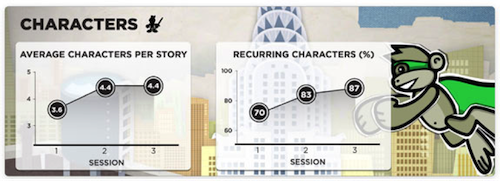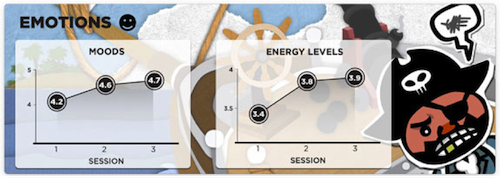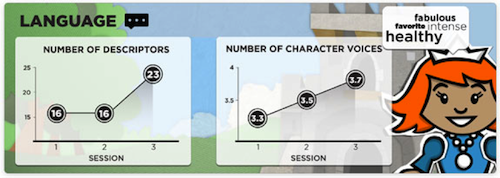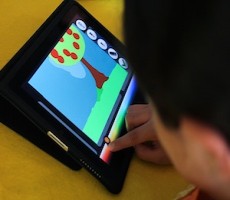 At Launchpad Toys, we’re working to inspire creativity in children through play with digital toys and tools like our flagship storytelling app, Toontastic. As tablet usage in young children increases year after year (NPD showed 13% growth between 2011 and 2012), it has become more important than ever to provide kids with quality learning tools that maximize their time on touchscreen devices. Still, in the immortal words of former President George W. Bush, “Rarely is the question asked: Is our children learning?” With over two million cartoons created on Toontastic by over 600,000 kids from 150 countries around the world, we decided this summer to take a closer, more scientific look at how children are interacting with the app and what they were learning from it.
At Launchpad Toys, we’re working to inspire creativity in children through play with digital toys and tools like our flagship storytelling app, Toontastic. As tablet usage in young children increases year after year (NPD showed 13% growth between 2011 and 2012), it has become more important than ever to provide kids with quality learning tools that maximize their time on touchscreen devices. Still, in the immortal words of former President George W. Bush, “Rarely is the question asked: Is our children learning?” With over two million cartoons created on Toontastic by over 600,000 kids from 150 countries around the world, we decided this summer to take a closer, more scientific look at how children are interacting with the app and what they were learning from it.
In observations at home and in the classroom, we used semi-structured play sessions with mixed-methods qualitative analysis to assess kids’ story development. At Trinity School in Menlo Park, CA, Mrs. Joan Young divided up her classroom of 20 fourth graders into groups of two or three and asked them to create stories about peer relationships using the app. After completing three stories over the course of one week, we then looked at three categories of variables in their completed cartoons—Character Development, Emotional Expression, and Language Usage—with the following results:
1) Character Development
a. Children used more characters in each successive session.
b. Recurring characters were more common in later sessions, suggesting more cohesive story arcs and character development over time.
2) Emotional Expression
a. Diversity of moods and energy levels increased over time.
b. In later stories, more emotional highs and lows were explored in the kids’ tales of peer relationships, adding more depth and color to their creations.
3) Language Usage
a. Adjectives and descriptive words such as “favorite,” “intense,” “fabulous,” and “healthy” were used much more often in later sessions, especially in the final one.
b. Kids were more likely to use distinctive voices for different characters over time, adding another dynamic element to their storytelling.
We’re thrilled to see growth in these key components of storytelling, each aligned to Common Core State Standards for K-5 English Language Arts & Literacy. While one classroom does not make for a representative sample, we’re so encouraged by the results that we’re now in the process of using these metrics defined in our pilot study to examine the wealth of data from the hundreds of thousands of cartoons on our global storytelling network, ToonTube. With this, we hope to combine quantitative and qualitative research methods to not only better understand how kids are improving their storytelling skills with Toontastic, but to develop better digital learning tools and provide meaningful feedback to parents, teachers, and kids.
There are broader implications as well. As tablet usage increases with standardized testing in classrooms, there has been an alarming downward trend in creativity scores, particularly in K-5 students. For more information on this, please see the Cooney Center blog series on “The Creativity Crisis.” Along with our pilot study and larger research initiative, we have also created the following video infographic to raise awareness of the “Crisis” and to challenge all of you creative parents, teachers, and kids out there to RISE above it. Please join us! It’s our time to Create, Learn, Play, and Avert the Creativity Crisis!
For more information on Toontastic, please visit launchpadtoys.com or download it from iTunes.
Andy Russell is an educational media producer and a co-founder of Launchpad Toys. Inspired by the movie BIG and a lifelong obsession with small brightly colored plastic bricks, Andy is a graduate of Learning Design programs at Stanford and Northwestern and has worked for companies like Hasbro and Sony PlayStation to design playful learning experiences for kids. Alicia Chang is a Cognitive and Developmental Psychologist working with Launchpad Toys to research how kids are learning through cartoon creation.







